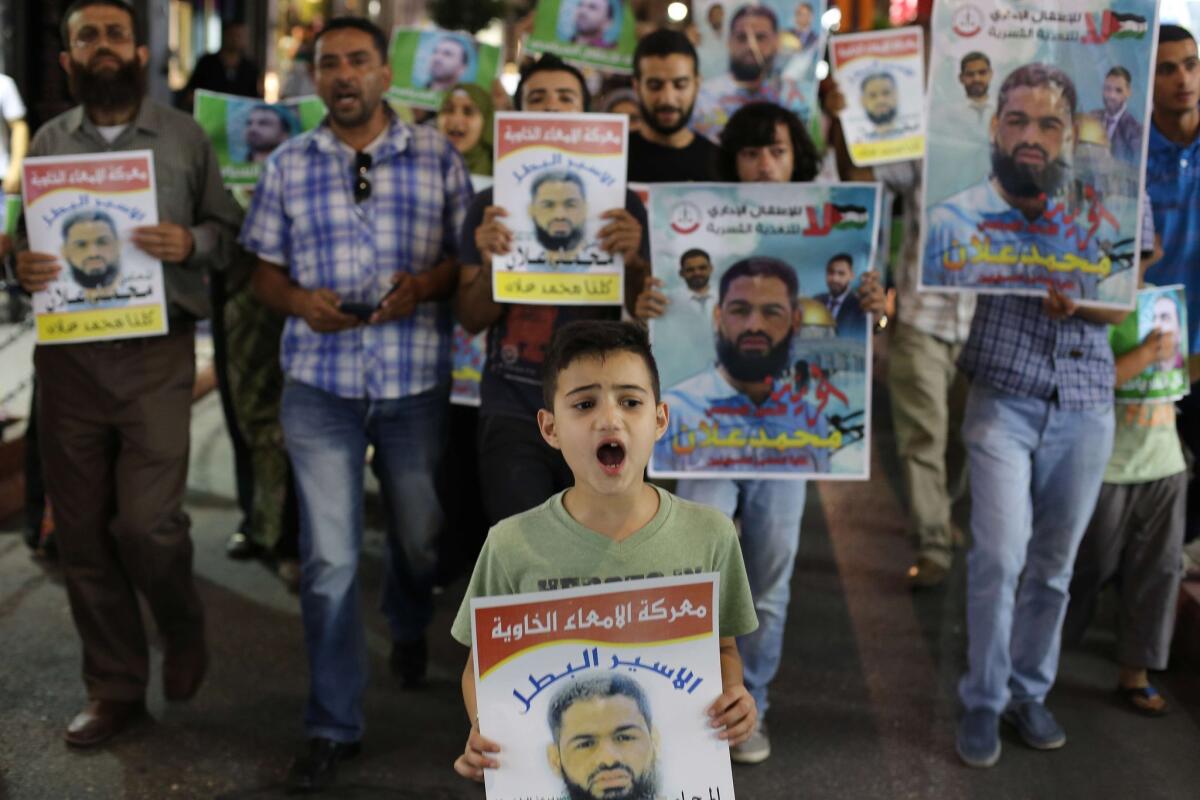Israel suspends detention of hunger-striking Palestinian prisoner with brain damage

Protesters take part in a rally in the West Bank city of Ramallah on Aug. 19 to show support for Mohammed Allan, a Palestinian prisoner who has been on hunger strike for more than two months.
Israel’s Supreme Court on Wednesday suspended the detention order for Palestinian prisoner Mohammed Allan, who has been refusing food since June, amid concern that he had suffered brain damage.
Allan, a lawyer from the West Bank accused by Israel of being a member of the militant Palestinian group Islamic Jihad, launched his hunger strike June 16 to protest his detention under a legal mechanism that allows suspects to remain in custody for months without trial. He was arrested in November and has not been charged.
Israel maintains that the practice, decried by human rights organizations, is designed to prevent terrorist attacks when there is insufficient evidence for an indictment or when a trial could compromise intelligence sources.
Authorities said Wednesday that Allan had suffered brain damage as a result of his lengthy hunger strike but that the extent of the damage remained unclear.
Israel recently passed a controversial law allowing the prison service to seek permission from a judge to force-feed hunger-striking prisoners if their lives are in danger or there is a threat of irreversible harm to their health.
However, the medical staffs at two hospitals have refused to treat Allan against his wishes. It was not until he lost consciousness Friday that he began receiving vitamins, minerals, electrolytes and fluids intravenously.
As Allan’s condition deteriorated, his attorneys petitioned the Supreme Court for his immediate release on medical grounds, saying he posed no security threat in his condition.
Allan’s counsel previously had rejected one Israeli proposal to release him on the condition that he be banished from the West Bank for four years and another to release him in early November.
On Wednesday, authorities agreed to release Allan immediately if his brain damage was permanent.
An MRI carried out at Barzilai Medical Center in southern Israel confirmed that he had suffered damage consistent with vitamin deficiencies from prolonged fasting and the mental incoherence he had shown during the day. However, hospital director Hezi Levy said at a news conference that it was too soon to tell whether the damage was reversible.
A short while later, the Supreme Court announced that the warrant for Allan’s detention was suspended, although he would remain hospitalized for treatment.
Jawad Boulous, one of Allan’s attorneys, welcomed the ruling, saying his client had “scored a number of victories, particularly defeating the force-feeding law and the administrative detention policy.” But he expressed regret that Allan’s legal status was not resolved.
Allan’s father, Naser, called the ruling “good news” and a “victory for Mohammed and the prisoners.” He was eager to see his son at home and in good health, he said.
In the family’s home village of Einabous, near Nablus in the West Bank, residents celebrated the news by sounding car horns and calling, “God is great!” from mosque minarets.
Israeli officials have expressed concern that releasing Allan could encourage other inmates to follow his example.
Minister of Public Security Gilad Erdan decried the Israel Medical Assn. for opposing the force-feeding law, which he said had deterred doctors from taking action to save Allan’s life. The association should “respect the law instead of taking actions that ultimately result in releasing terrorists,” he said in a Facebook post.
The association argues that force-feeding is dangerous and amounts to torture.
Allan remained in serious medical condition late Wednesday.
Times special correspondents Sobelman reported from Jerusalem and Abukhater from Ramallah, West Bank.
More to Read
Start your day right
Sign up for Essential California for news, features and recommendations from the L.A. Times and beyond in your inbox six days a week.
You may occasionally receive promotional content from the Los Angeles Times.






